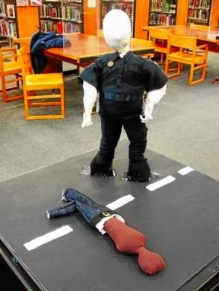Oscar Wilde may have believed that “Life imitates Art far more than Art imitates Life,” but this hackneyed statement was recently turned on its head when Lethia Cobbs unveiled her installation, “Dollandia,” at the Long Beach Public Library. The piece — which depicts a white police officer doll pointing his fingers as a gun at a black armless doll lying on the ground — prompted immediate backlash from library staff. So much so, that the staffer in charge of art exhibits asked her to remove the doll from the collection because it was “too controversial”.
It’s difficult for both free speech organizations and art enthusiasts alike to witness such a blatant disregard for First Amendment rights and artistic expression, especially when the art in question embodies a vital political and social issue. Cobbs — who was told to be “edgy” — was trying to incite viewers to start an important conversation about race and law enforcement: “It’s me wanting to say something. It’s thought-provoking,” she said. Especially in an environment such as a library, art exhibits should stimulate the mind and heart, not provoke censorship and ignorance.
Thankfully, this past January, a library official contacted Cobbs and asked her to return the doll to the display, citing a “misunderstanding”. In response, the National Coalition Against Censorship (NCAC) along with the American Library Association (ALA)’s Office for Intellectual Freedom and the ACLU of Southern California sent the below letter to Mayor Robert Garcia, applauding the decision. The organizations also offer their “assistance in preparing guidelines for the display of art in libraries” in the hopes that incidents of censorship become few and far between.
While it is important to gather support when iterating the need to protect free expression, we believe that Cobbs herself said it best as she stood by a display in the library bringing awareness to banned books: “There’s great irony in them having the book burning exhibit and what happened to me.” We can’t agree more.


